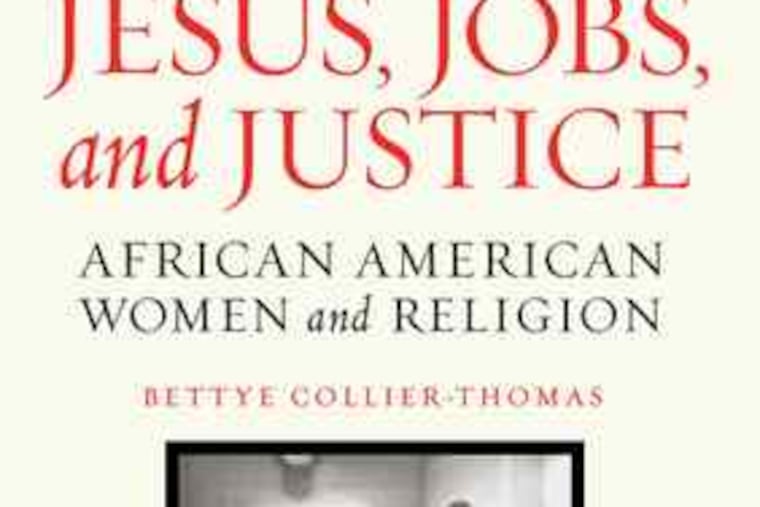Black women's influence of faith
A wide survey looks to the foundations of the female role in organizing for social justice.

African American Women and Religion
By Bettye Collier-Thomas
Alfred A. Knopf. 695 pp. $37.50
nolead ends nolead begins
Reviewed by Marla Frederick
Bettye Collier-Thomas'
Jesus, Jobs and Justice
is a tour de force for the study of women and religion.
It navigates within and beyond the walls of institutional religion to delineate the tremendous contributions of African American women of faith to the larger American project.
Collier-Thomas, professor of history at Temple University, makes the convincing argument that it was, indeed, the amazing networks of organizations that women developed in the 1920s and '30s that laid the foundation for the success of the civil rights movement.
In 509 pages of narrative text, we witness the historical record of black women's struggles since emancipation for true freedom, justice, education, and livelihood. Ultimately, this struggle led them to work alongside and also confront black men, white women, white men, and at times one another in the quest for a better world.
Collier-Thomas' book expands on the work of historians such as Evelyn Brooks Higginbotham, Jualynne Dodson, and Anthea Butler, who focus on women's labors within particular denominations - the National Baptist Convention, the African Methodist Episcopal Church (AME), and the Church of God in Christ.
Instead of locating women's activities within the exclusive framework of a particular denomination, Collier-Thomas examines their contributions across denominational affiliations for the advancement of women in ministry, the spread of global missions, and the structuring of a national political agenda.
Her work broadens earlier interpretations of how women structured their efforts on behalf of justice. She highlights the significance of geographical location and social relations for understanding how different denominations responded to the question of women in ministry.
She argues, for example, that the Christian Methodist Episcopal Church (CME), founded in the South after the Civil War, differed in the intensity (if not the kind) of its opposition to women's leadership in the church from the AME and African Methodist Episcopal Zion churches. Those two churches were formed in the North, more than 50 years before to the war.
"Lacking the education, money and influence of the AME, AME Zion and Baptist denominations . . . CME clergy had a greater need - individually and collectively - to prove themselves as men," she writes. CME leaders - mostly rural former slaves who relied heavily on the white Methodist Episcopal Church, South for support - staunchly disapproved of women's advancement within the denomination.
While AME Zion church leaders of the late 19th century were still reluctant to accept women's leadership, they had a different cadre of women in their ranks with a different relationship to their leadership, Collier-Thomas contends. AME Zion women were "seasoned antebellum radicals and former abolitionists, women's rights activists, and suffragists . . . who were unwilling to compromise with the old-guard male leaders." Thus, in 1895 the AME Zion church became the first black denomination to officially ordain women to the ministry - Julia Foote and Mary Small.
Collier-Thomas further complicates the narrative of women's service within the church by examining the history of women's foreign mission work, which took place under the specter of American racism and European colonialism. Herculean efforts made by women in the work of overseas missions-establishing schools, building homes, and ministering the gospel - did not occur without black denominational concerns about the potential for paternalism and imperialist attitudes, even among black missionaries who possessed a desire to help. Collier-Thomas' attention to these narratives offers a more nuanced way of thinking about African American women's efforts toward racial advancement outside the United States.
As the book progresses, one realizes that much of the majesty of Jesus, Jobs and Justice is its recounting of women's labors within and across nearly 100 religious, social and political organizations spanning the 19th and 20th centuries.
It was, after all, the insistence of Nannie Helen Burroughs, a major leader among black Baptist women, that "the Negroes must have Jesus, Jobs and Justice" that expressed the concern defining much of the work of these organizations. Using organizational networks, women confronted issues related to education, lynchings, civil rights, women's rights, and economic uplift. In addition, their interracial coalitions allowed them to advance more effectively their race/gender agenda.
Given the accomplishments of these organizations, Collier-Thomas, in the "coda" to her book, bemoans their decline in the 21st century as women, despite ecclesiastical advances, continue to face issues of gender inequality in church and society.
The breadth of Collier-Thomas' work is impressive. Throughout the text, she makes subtle challenges to simple and accepted narratives of women's uplift, pointing at the not-so-obvious ways in which women organized.
The strength of this book, its breadth, also will be for some audiences its Achilles' heel. Collier-Thomas' striking knowledge of women's history, and African American women's history in particular, comes through and at times overwhelms a clear and concise narrative.
Nevertheless, it is this exhaustive maze of organizations, people, and political positions that underscores the true significance, organic genius, and enormous sacrifices of African American women of faith of this era.
Jesus, Jobs and Justice is a must-read in the study of religion and social change in America.